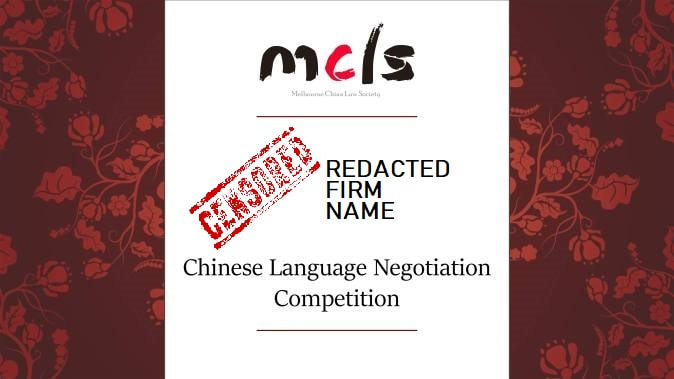|
Issue 8, Semester 1 By Yujie Du Editor's note: The print edition didn't mention which negotiation competition the author participated in. For clarity, this article refers to the competition [NAME REDACTED] which was run by the Melbourne China Law Society, not the LSS. This competition was sponsored by [NAME REDACTED]. The cached webpage for the competition can be found here: https://tinyurl.com/y8pfw6qj I competed in the MCLS [NAME REDACTED] competition and lost, and I’m pissed. I got angry not because I lost, but because I felt I lost with no reasonable justifications and different judges gave inconsistent feedback. This isn’t because of our opponents or judges; the competition seems to be unfair. It is not framed as strictly as other competitions. In mooting, the rules are clear: you have a set pattern of written and oral submissions, after which you basically know whether you win or lose at the moot. For negotiation? No such thing. the negotiation judges have too much discretion. Of course they want to be objective, but under such arrangements , they subconsciously bring with them their personal judgments to the competition. 1. A Preferred Negotiation Style? ‘You lost because you are too strong.’ Then you try to be nice next time. ‘You lost because you did not fight for your client.’ One judge really likes how one party was humble and sincere. Another judge can be just the opposite. What should you do? Maybe do some personal research to find out your judge’s personal preference? To be honest, if you need to know a judge’s preferences before a competition, the competition is just not fair! 2. Uneven Negotiation Power Based on Facts? In one competition, we were the ‘bad person’ and what the client wanted was to get rid of the liabilities as much as possible. The feedback was: ‘You should apologise first since you are the faulty person and be nice to the other party’ You lose when you are not being nice (because you are faulty); you also lose when you’re being too nice (because you did not get what the client wanted). So? Was I just destined to lose based on the facts? 3. Awkward ‘Fight to Talk’ Situation In a negotiation, sometimes you have to cut-off the other side when they are elaborating some points you think are off the topic. I got the feedback that I lost because I interrupted the other party while they were talking and that was rude. But I knew if I hadn’t interrupted, I would have talked too little and have still lost the competition. To respond the problems I met, here are some recommendations for future negotiation competitions: 1. Clear instructions for the competition. Including the objectives of the competition, the encouraged behavior and specific rules. 2. Even bargaining power granted for both sides. The facts given to both parties shall be designed at best to give equal bargaining power to each side to free the judge from the distraction of considering the standing position of each party. Therefore the judges can focus on the performance of the participants. 3. Structured/framed negotiation process.
4. Employ a panel of judges (odd number) instead of a single judge.
5. If there is a chance, the competition should be public. Publicity will avoid perceptions of discrimination. The whole negotiation competition can be better designed to ensure a procedural fairness and people will not feel frustrated and angry after a fair game.
NPJ
24/4/2018 12:00:52 pm
There are lots of things to say about this, but in sum: you are not alone.
Yujie Du
24/4/2018 02:36:18 pm
Thank you so much for your sincere reply. Comments are closed.
|
Archives
October 2022
|



